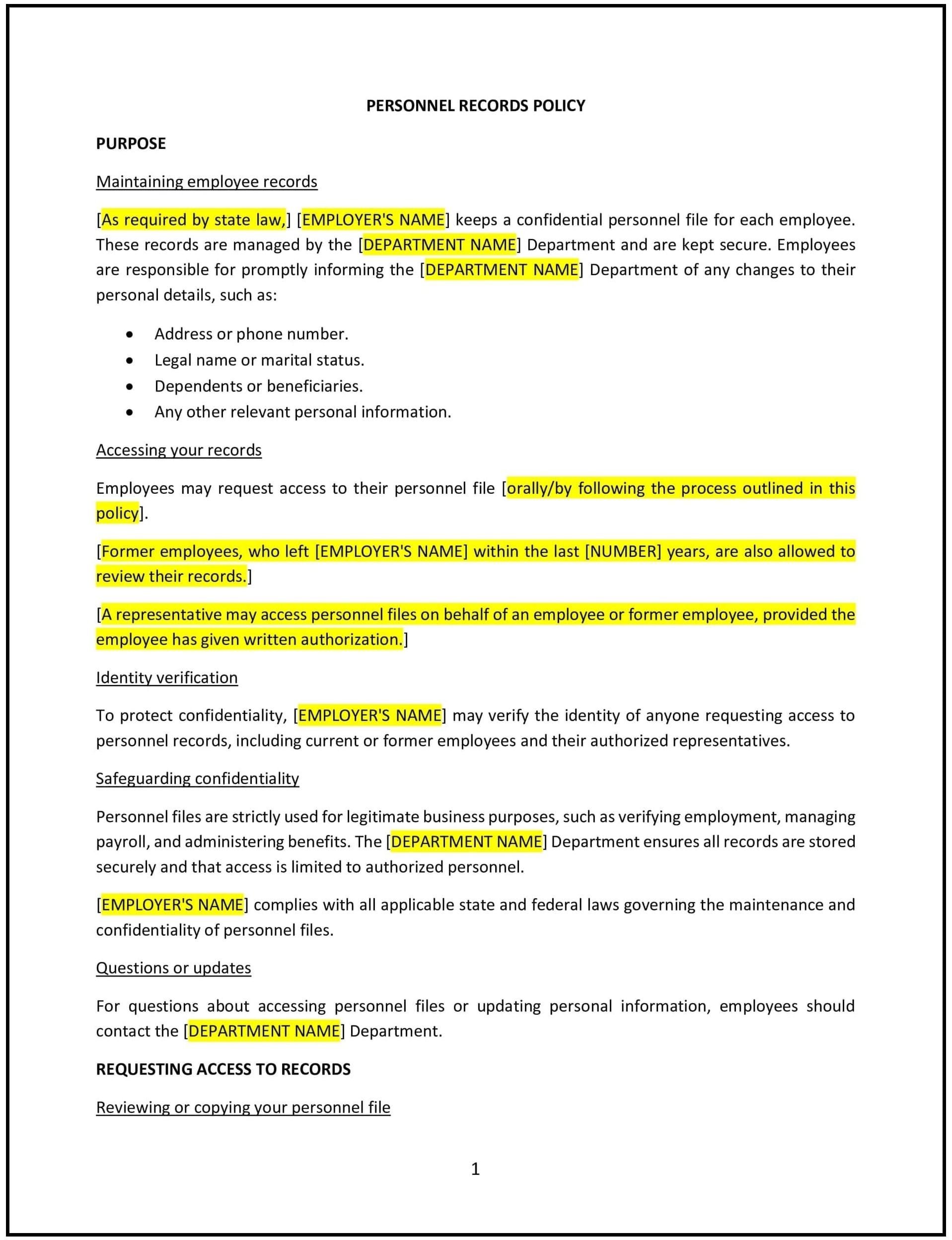Personnel records policy (New Hampshire): Free template
Got contracts to review? While you're here for policies, let Cobrief make contract review effortless—start your free review now.

Customize this template for free
Personnel records policy (New Hampshire)
A personnel records policy helps New Hampshire businesses manage and protect employee records. This policy outlines the types of information that will be maintained, how it will be stored, who will have access to it, and the procedures for handling requests to view or update records. It aims to ensure that employee records are kept accurate, secure, and confidential, while complying with relevant privacy laws.
By implementing this policy, businesses can maintain proper documentation for all employees, protect sensitive information, and ensure transparency and fairness in record-keeping practices.
How to use this personnel records policy (New Hampshire)
- Define the types of personnel records: Specify what information will be maintained in personnel records, including personal information (e.g., name, address), employment history, job performance records, compensation details, disciplinary actions, and any legal or medical records required by law.
- Set retention periods: Establish how long different types of records will be kept. Define retention periods for documents like employment contracts, performance evaluations, and benefits information, and state when records will be securely disposed of.
- Address employee access to records: Explain the process for employees to request access to their personnel records, and specify under what conditions the company will grant access or provide copies of these records.
- Outline confidentiality and security measures: Clearly define how personnel records will be protected from unauthorized access. Include details on physical and electronic security measures, such as locked cabinets, password protection, and restricted access to employee data.
- Address third-party access: Specify the circumstances under which employee records may be shared with third parties, such as government agencies, benefits providers, or in the event of a legal requirement, and how employees will be informed of such sharing.
- Review and update records: Establish procedures for maintaining accurate records, including regular reviews and updates. Outline how employees can update their personal information or correct inaccuracies in their records.
- Ensure compliance with legal requirements: Ensure that the policy aligns with New Hampshire state laws, as well as federal regulations like the Fair Credit Reporting Act (FCRA), the Health Insurance Portability and Accountability Act (HIPAA), and the Family and Medical Leave Act (FMLA).
- Review and update: Regularly review and update the policy to ensure it reflects current legal requirements and best practices.
Benefits of using this personnel records policy (New Hampshire)
This policy offers several benefits for New Hampshire businesses:
- Protects employee privacy: By setting clear rules for handling and storing personal information, businesses protect employee privacy and avoid potential breaches of confidentiality.
- Improves record-keeping: A defined policy ensures that all necessary employee information is properly collected, stored, and updated, improving the organization’s efficiency and accountability.
- Reduces legal risks: Properly managing employee records and following legal guidelines reduces the risk of violations of privacy laws or disputes over access to personnel information.
- Builds trust: Transparent and consistent handling of personnel records fosters trust between the company and its employees, improving morale and employee relations.
- Enhances compliance: The policy helps businesses comply with federal and state regulations by establishing procedures for record retention, access, and sharing.
Tips for using this personnel records policy (New Hampshire)
- Communicate the policy clearly: Ensure that employees are aware of how their personnel records will be maintained and what rights they have regarding access to and correction of their records.
- Maintain accurate records: Regularly review personnel records to ensure they are up to date and reflect accurate information, particularly in the case of job changes, promotions, or benefits updates.
- Secure sensitive data: Implement strict security protocols for handling sensitive employee data, such as medical records or financial information, and ensure that only authorized personnel have access to it.
- Address record discrepancies promptly: If discrepancies are found in personnel records, address them promptly and transparently with the employee to correct any inaccuracies.
- Review retention periods: Regularly assess the appropriateness of retention periods for different types of records to ensure compliance with legal requirements and business needs.